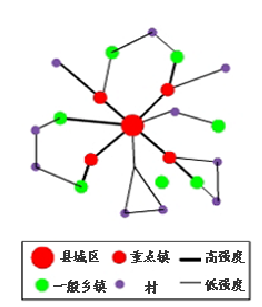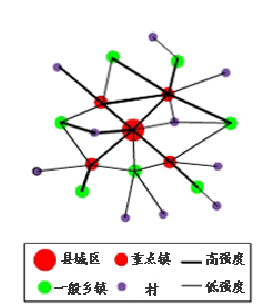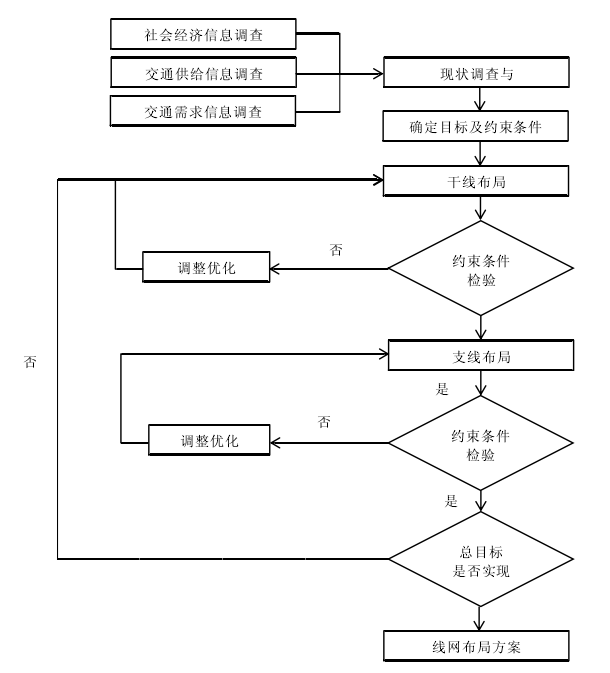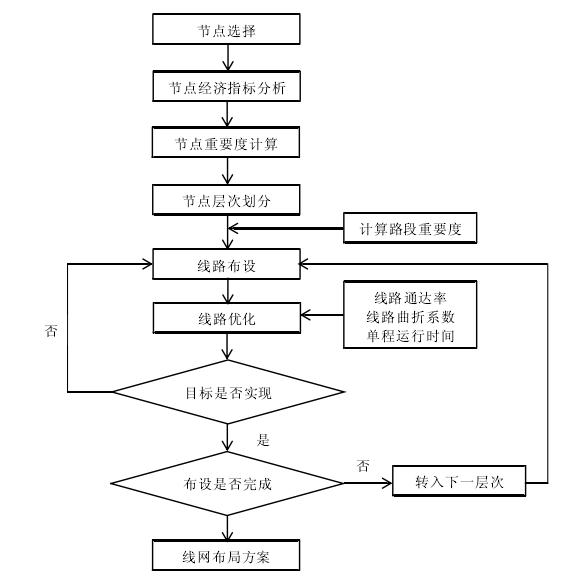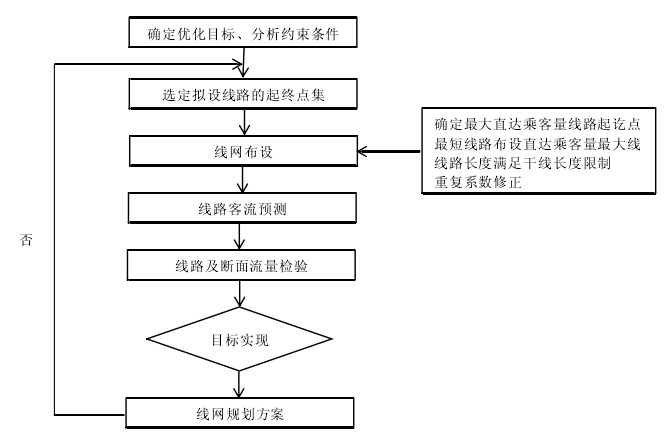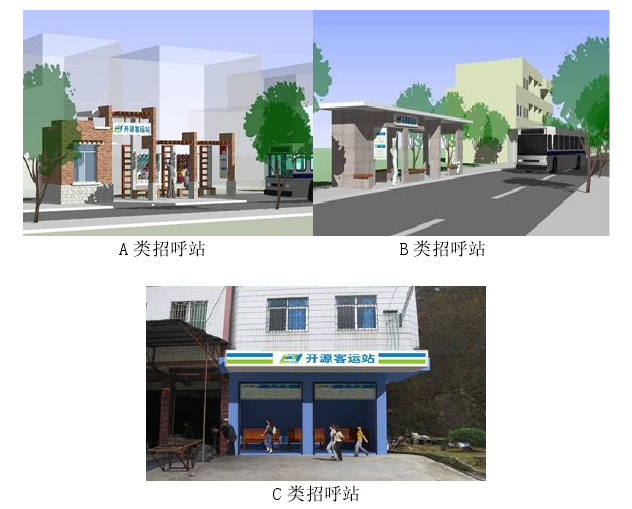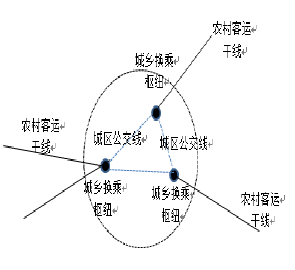自拟毕业论文选题毕业论文
2020-04-12 16:52:29
摘 要
众所周知,交通是人类衣食住行四大基本生活保障中的重要内容,是人们群众最关心、最直接、最现实的利益,与广大农村地区人民群众生产生活息息相关。客运班线是农村地区的基础设施之一,是城乡和乡镇之间政治、经济、文化生活不可缺少的纽带,是近郊城乡居民出行的主要交通工具之一。随着国民经济的快速发展,城市近郊地区也处于不断改造的过程,由农村成为城市的一部分。就目前而言,国内绝大多数县级城市尚未编制农村客运系统规划,部分县级城市片面直接套用城市公共交通规划理论指导农村客运发展,难以很好地反映农村客运市场发展实际。基于这种情况,本文主要就对城乡公交一体化基础理论进行详细的阐述,主要阐述了城乡公交的定义及发展历程、城乡公交一体化的定义及研究对象、城乡公交一体化的特点等;与此同时,还对农村客运线网规划布局方法进行了阐述,主要阐述了线网布局原则、线网结构分析、线网布局思路、线网布局方法、与城市客运的换乘衔接线路调整优化方法;另外,对站点规划布局方法进行研究,主要研究了站点布局原则、站点分类、站点布局方法等;第四个方面主要就是运力估算与运输组织研究,主要阐述了干线车辆运力配备、支线车辆运力配备、城乡一体化运输组织、客运班线“公交化“改造、农村客运区域专营等。通过对这些内容的研究分析可以帮助近郊客运班线更好的运行,而且还可以对其城市公交化改造方法进行详细的阐述,带动近郊客运班线城市公交化的改造,加强农村地区的经济建设和发展。
关键词:近郊客运班线;城市公交化;近郊公交线网布局方法;站点规划
Research on Urban Public Transit Transformation Methods for Rural Passenger Transport Lines
Abstract: As we all know, rural passenger transport is an important part of the four basic livelihood guarantees for human beings. It is the people's most concerned, most direct, and most realistic interest. It is closely related to the production and life of the people in the vast rural areas. Public transportation is one of the infrastructures in rural areas and is an indispensable link between the political, economic, and cultural life between urban and rural areas. With the rapid development of the national economy, the rural areas are also undergoing a process of constant transformation. Traffic congestion has become more frequent and travel has become more inconvenient. At present, most of the county-level cities in China have not yet compiled a rural passenger transport system plan. Some county-level cities directly apply urban public transport planning theory to guide the development of rural passenger transport. It is difficult to reflect the actual development of the rural passenger transport market. Based on this situation, this article mainly elaborates on the basic theories of urban-rural public transport integration, and mainly elaborates the definition and development history of urban and rural public transport, the definition of urban-rural public transport, the research objects, and the characteristics of urban-rural public transport integration; At the same time, the method of planning and layout of rural passenger traffic network was also elaborated. The principle of line network layout, analysis of line network structure, layout of line network, method of line network layout, and adjustment and optimization method of transfer lines with urban passenger transport were mainly elaborated. In addition, the method of site planning and layout was studied, mainly including site layout principles, site classification, site layout methods, etc. The fourth aspect was mainly the capacity estimation and transportation organization research, which mainly elaborated the capacity of mainline vehicles and the capacity of regional vehicles. Equipped with the integration of urban and rural transport organizations, "transportation" transformation of passenger transport lines, and rural passenger transport area franchise. Through research and analysis of these contents, it is possible to help rural passenger trains run better, and it is also possible to explain in detail the methods of urban bus transformation, to promote the transformation of urban public transport in rural passenger transport in China, and to strengthen the economy in rural areas. Construction and development.
Keywords: rural passenger transport line; urban public transport; transformation method; layout method; site planning
目录
1.绪论 1
1.1研究背景与意义 1
1.1.1研究背景 1
1.1.2研究意义 1
1.2国内外研究概况 1
1.2.1国外研究现状 1
1.2.2国内研究现状 2
1.3研究内容 3
1.4研究思路 4
2.城乡公交一体化基础理论 5
2.1城乡公交的定义及发展历程 5
2.1.1城乡公交的定义 5
2.1.2城乡公交的发展历程 6
2.2城乡公交一体化的定义及研究对象 7
2.2.1城乡公交一体化的定义 7
2.2.2城乡公交一体化的研究对象 7
2.3城乡公交一体化的特点 8
2.3.1区域性 8
2.3.2系统性 8
2.3.3开放性 8
2.3.4发展的过程性和动态性 9
2.4城乡公交路线运营的道路网结构分析 9
3.近郊客运班线城市公交化规划方法 10
3.1 线网改造与规划布局方法 10
3.1.1 线网规划布局原则 10
3.1.2 线网结构分析 11
3.1.3线网布局思路 12
3.1.4线网布局方法 13
3.1.5线路调整优化方法 15
3.2站点规划布局方法研究和合并 15
3.2.1站点布局原则 15
3.2.2客运班线站点分类 16
3.2.3与城市客运的换乘衔接 16
3.2.4站点布局方法 17
3.3 车辆配备与车型选择 18
3.3.1干线车辆运力配备 18
3.3.2支线车辆运力配备 18
4.客运班线公交化改造的保障措施 19
4.1加强车辆配备 19
4.2完善城乡一体化运输组织 19
4.3加强客运班线“公交化“改造力度 21
4.4遵循农村客运区域专营原则 21
4.5政策保障措施 21
5.孝感市近郊客运班线公交化改造实例分析 22
结论与展望 25
参考文献 26
致谢 29
1.绪论
1.1研究背景与意义
1.1.1研究背景
众所周知,公共交通是农村地区的基础设施之一,是城乡和乡镇之间政治、经济、文化生活不可缺少的纽带。随着国民经济的快速发展,农村地区也处于不断改造的过程,交通的拥堵越来越频繁,出行变得更加不便。这些现状已经引起了政府公众和社会各界的广泛关注,在吸收各国近郊客运班线成功经验的基础上,有关专家学者一致认为优先发展近郊客运班线城市公交化是一条解决我国农村交通问题的有效途径。
1.1.2研究意义
农村客运是人类衣食住行四大基本生活保障中的重要内容,是人们群众最关心、最直接、最现实的利益,与广大农村地区人民群众生产生活息息相关。2012年7月,国务院印发《国家基本公共服务体系“十二五”规划》,明确提出到2015年底,所有行政村实现通公路和客运班车。党的十八大报告中强调,解决好农业农村农民问题是全党工作重中之重,必须深入推进新农村建设,全面改善农村生产生活条件,提出到2020年全面建成小康社会。近郊客运班线规划是指导农村客运发展的综合性和基础性文件,对促进农村客运健康、有序发展具有重要指导意义。
1.2国内外研究概况
1.2.1国外研究现状
在实施公交路线建设方面,Procedia,(2017)指出在对近郊公交路线进行建设的时候需要注意对近郊公交路线的规划,需要采用比较好的线路规划方法对公交路线进行规划建设,这样可以使得城市与农村地区之间的联系变得更加紧密,有利于带动农村地区和 城市地区社会经济的可持续发展[1]。
Mark Beecroft(2016)指出在对近郊线路上公交停靠站进行建设的时候需要选择合理的位置,确保近郊客运班线的公交停靠站能够涉及到更多的人们,给更多的农村人带来交通方便[2]。
以上是毕业论文大纲或资料介绍,该课题完整毕业论文、开题报告、任务书、程序设计、图纸设计等资料请添加微信获取,微信号:bysjorg。
相关图片展示:
